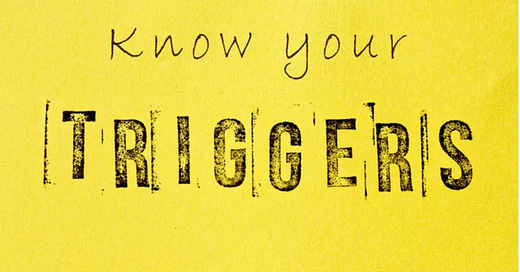Trigger Warning!
How to anticipate and identify emotional triggers and regulate your nervous system like a boss.
Triggers are unavoidable.
Triggers are things that elicit some sort of an extreme emotional state. While these emotional states aren't necessarily reflective of an external reality or how you should react, they are reflective of a very real internal one that can snap us out of the present and get in our way.
No matter how much work we do, there will always be circumstances that are likely to trigger our self-beliefs.
Your self-concept might be triggered when a stressful memory comes up, or if you feel yourself lacking purpose.
A family member might trigger you if they behave unsympathetically or if you find yourself having to depend on an unreliable family member for safety, protection, or basic needs.
You might get a negative evaluation at work, or feel pressure from others’ high expectations of you.
The good news is that the better you know your triggers, the better prepared you’ll be to notice when you find yourself lost in unhelpful or painful thoughts and emotions that can direct you toward actions that don’t serve you well.
When you develop a greater awareness of these triggers, you can learn to self-regulate to get yourself back on track to feeling safe, secure, and empowered.
Self-Regulation as a Muscle
Self-regulation is like a muscle. It takes time to strengthen. But as you work out your self-regulation muscle, you’ll start to notice that when something happens that has you feeling like you’ll respond based on a trigger to our self-beliefs, you can counter that feeling and engage in an even keeled way.
To help you with this practice, I want to share with you some short exercises that you can use whenever you find yourself triggered to act in a way that might be unproductive to your goals and mental wellness.
TIPP the Scales in Your Favor
This exercise is called TIPP. TIPP stands for:
Temperature,
Intense Exercise,
Paced Breathing, and
Progressive Muscle Relaxation.
TIPP represents four different methods you can use to ground and center yourself when you find yourself triggered.
Temperature. When upset, our bodies tend to run hot. Changing the temperature will help you to experience calm and get out of the fight or flight impulse. Cooler temperatures tend to decrease your heart rate. Try holding an ice cube, splashing your face with cold water, going outside for a walk if the weather is cool, or cooling your face with a hand-held fan.
Intense Exercise. When you experience an intense or overwhelming emotion, it can be helpful to expend nervous energy by doing a brief cardio session. Do jumping jacks, run in place, dance to your favorite song, or hop up and down for a couple of minutes.
Paced Breathing. Overwhelming feelings can quicken our breath, which can lead to hyperventilation or other stressful bodily responses. To counter this, pay attention to your breath and slow it down. Try to slow your inhales and exhales with the 4-7-8 method of deep breathing. Inhale through your noise and count to 4. Hold your breath for a count of 7, then breathe out slowly through your mouth for a count of 8. Repeat several more times until you notice that you feel more relaxed and less overwhelmed.
Progressive Muscle Relaxation. Relax the tense muscles in your body by doing this quick exercise. First, do a quick body scan and notice any areas that feel particularly tense. When you notice tension in a muscle (like the one in your calf), tighten it, hold for five seconds, then relax it completely and allow it to rest. By squeezing and then relaxing the tense muscle you’ll find that the initial tension is released. Repeat this for the different areas of your body where you experience tension.
When you find yourself in a trigger state, give one of these techniques a try and see how things change.
Cheers,
Judy
Order here: https://bit.ly/3MvuvvF
Follow me on InstagramFollow me on Facebook
About me:
Dr. Judy Ho, Ph. D., ABPP, ABPdN is a triple board certified and licensed Clinical and Forensic Neuropsychologist, a tenured Associate Professor at Pepperdine University, television and podcast host, and author of Stop Self-Sabotage. An avid researcher and a two-time recipient of the National Institute of Mental Health Services Research Award, Dr. Judy maintains a private practice where she specializes in comprehensive neuropsychological evaluations and expert witness work. She is often called on by the media as an expert psychologist and is also a sought after public speaker for universities, businesses, and organizations.
Dr. Judy received her bachelor's degrees in Psychology and Business Administration from UC Berkeley, and her masters and doctorate from SDSU/UCSD Joint Doctoral Program in Clinical Psychology. She completed a National Institute of Mental Health sponsored fellowship at UCLA's Semel Institute.






